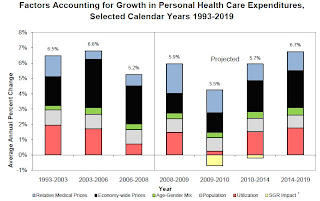A new HHS study shows that health care costs increased last year at the fastest rate in more than a half century. Health care spending rose to an estimated $2.5 trillion in 2009, or $8,047 per person—and is now projected to nearly double by 2019 to $4.7 trillion.
"Spending on health care consumed an estimated 17 cents of every dollar spent last year in the US, representing the largest one-year increase since the federal government started tracking the number in 1960. By 2019, health care spending will represent 19.3% of the nation's total economic output, according to a report released today by the Centers for Medicare and Medicaid Services. The report is the latest indication of the nation's mounting medical expenses and it comes as Congress has stalled on President Obama's proposal to revamp the health care system."
Growth in national health expenditures (NHE) in the United States is expected to have increased faster than the growth in the Gross Domestic Product (GDP) last year, according to a report issued today by the Centers for Medicare & Medicaid Services (CMS).
In 2009, NHE is projected to have reached $2.5 trillion and grown 5.7 percent, up from 4.4 percent in 2008 (the latest available historical year), while GDP, with the economy still in recession, is anticipated to have declined 1.1 percent.
"The projected acceleration in growth for 2009 was due in part to faster spending growth for the Medicaid program (9.9 percent; up from 4.7 percent in 2008), reflecting increasing growth in enrollment associated with the recession. Also contributing to the acceleration was faster growth in the use of a variety of health care services as many sought treatment for the H1N1 virus and an expected increase in the take-up rate for coverage provided through COBRA in response to the government's subsidization of COBRA premiums. As a result of NHE growth outpacing GDP growth in 2009, the health share of GDP is expected to have increased from 16.2 percent of GDP in 2008 to 17.3 percent in 2009, which would represent the largest one-year increase in history."








No comments:
Post a Comment